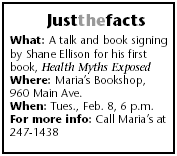|
‘Health Myths Exposed’ tackles medical industry
by Amy Maestas
Health Myths Exposed: Learn How to Avoid Deadly Health Myths - Add 10 Years to Your Life; By Shane Ellison; Author
House, 209 pages
A quick Internet search reveals that in 2004 alone, the U.S. Food and Drug Administration
recalled more than 40 drugs because of various safety reasons. No doubt, Americans heard about a handful of some of
the more popular drugs and their dangers. They were, after all, purported antidotes for common ailments like heart
disease and arthritis.
Keeping it in perspective, pulling that many drugs out of the hundreds of thousands of approved drugs on the market
seems relatively minor. But looking at the larger picture, the recall actions may seem more foreboding than what is
on the surface. That's why local author Shane Ellison's new book is well timed. In Health Myths Exposed,
Ellison takes head-on the validity and science of 10 various health claims he deems myths. When readers drill down
each broad myth, separated into chapters, they will find attention to a range of well-known subjects - including
cholesterol-lowering drugs, heart disease, anti-depressants, ephedra and obesity.
Ellison, an organic chemist, usually distills explanations to a level palatable to general readership, though
scientific terminology must be used. Most of his information is heavily footnoted, often incorporating a diversity of
studies culled from both the mainstream and alternative health industries, sometimes even those regarded as from the
fringe. The result, then, is mixed. Ellison's book is comprised of hits and misses, but always arguable.
Hits: Myths 1 and 2. Ellison immediately attacks the prevailing beliefs that drugs approved by the FDA are safe and
effective. Relying on a spate of information, Ellison points out numerous examples of mostly prescription drugs on
the market that have deadly side effects. He repeatedly excoriates the government agency for its lack of honesty and
ethics in the process of overseeing clinical studies and seeing the drug through to the shelves of pharmacies. This
includes lack of thorough research as well as putting profit before patient protection. The consequences can, he
points out, be worse than the disease a drug is trying to combat. Furthermore, he explains how the government and
pharmaceutical companies have shamefully become bedfellows.

|
|
|
Hits: Myths 1 and 2. Ellison immediately attacks the prevailing beliefs that drugs approved by the FDA are safe and
effective. Relying on a spate of information, Ellison points out numerous examples of mostly prescription drugs on
the market that have deadly side effects. He repeatedly excoriates the government agency for its lack of honesty and
ethics in the process of overseeing clinical studies and seeing the drug through to the shelves of pharmacies. This
includes lack of thorough research as well as putting profit before patient protection. The consequences can, he
points out, be worse than the disease a drug is trying to combat. Furthermore, he explains how the government and
pharmaceutical companies have shamefully become bedfellows.
As if rushing drugs to market isn't bad enough, Ellison also provides examples of misleading advertising of these
medicines. He prefers most often to call them "damned lies." The FDA, he states, has strayed from its original charge
of making sure pharmaceutical companies present a fair balance between the risks and benefits of a drug when
advertising it.
A miss: Myth 3. Ellison categorically denies the usefulness of pharmaceutical drugs except in the cases of
emergencies. Lowering his arguments to a bit of hype, the author states "prescription drugs kill more people than
terrorism, car crashes, AIDS and street drugs combined." He regards these drugs as "an expensive way to die." For any
of us who partake, Ellison boldly declares "most Americans have one foot in the grave." Recent studies have claimed
that about 40 percent of Americans are taking at least one prescription medicine. If both are true, the forecast
seems far gloomier. Yet, Ellison may be accused of using broad strokes to paint his picture. What of those people
whose lives have been undeniably saved by a daily prescriptive regiment? It doesn't require much common sense - or
even a medical degree - to believe that this is true.
Another less obvious miss in Ellison's book is entwined in his myth about nutritional supplements. In debunking it,
Ellison avows their safety and efficacy. As in all other places, he provides tangential proof. What the reader
doesn't learn outright is that Ellison is the founder of Health-FX Nutraceuticals, a company that produces and sells
natural medicines and supplements. The author's bio makes it clear only that Ellison is an organic chemist,
consultant to the nutritional supplement industry and responsible for designing such products. If he is worried about
the blending of mainstream medical claims and profiteering, should readers wonder the same about him?
In general, there are times in Health Myths Exposed that Ellison falls short of understanding that science is
messy and uncertain. It is often a back-and-forth process that does not always mean the results are eternally
concrete. Moreover, when it comes to medical science, politics plays a big role. That's inherent given that research
agendas are set by national policy and debated by lawmakers. Reliable information about health is never guaranteed.
All of us are aware of the sad truth that the medical industry has turned itself on its ear and traded patient
welfare for payola.
That is why it is critical for people trying to comprehend medicine and politics to judge each new bit of information
- be it a media story or health study - on its own merits. And that is also why Ellison's book is worthwhile. To
scrutinize all of the information thrown our way, American consumers of medicine and health products must have access
to all opinions and studies of the enduring debate about how to keep one foot out of the grave. Health Myths
Exposed is useful as a part in the dialogue.
|